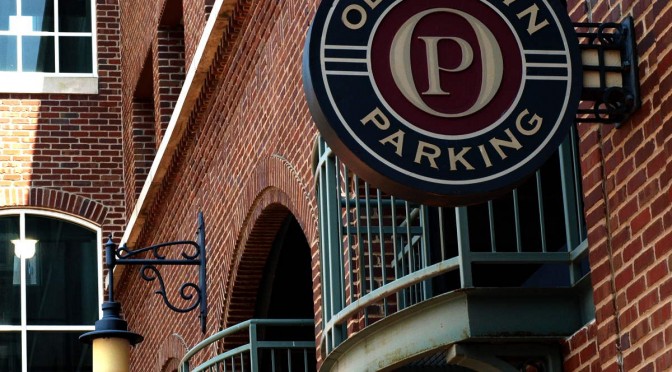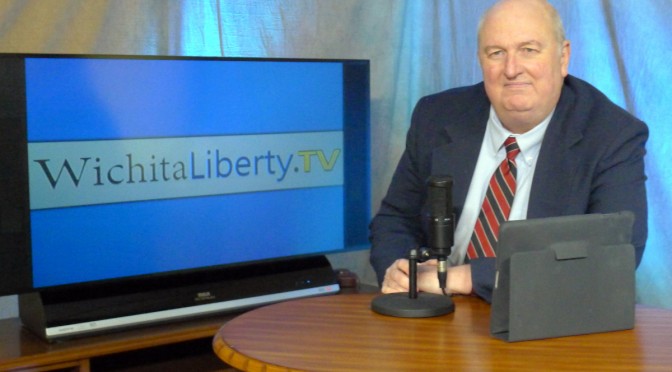In this episode of WichitaLiberty.TV: A look at a special district proposed for Old Town, the process of granting economic development incentives and a cataloging of the available tools and amounts, and an example of waste in Wichita. Episode 43, broadcast May 18, 2014. View below, or click here to view on YouTube.
Tag: Regulation

Wichita seeks to form entertainment district
A proposed entertainment district in Old Town Wichita benefits a concentrated area but spreads costs across everyone while creating potential for abuse.
 This week the Wichita City Council will consider forming an entertainment district covering greater Old Town. The purpose of the new law, according to city documents, is to help control crime in the area. Current law enforcement efforts are not effective, declares the proposed statute: “WHEREAS, the occurrence of criminal activity in the Old Town Entertainment District and areas adjacent thereto continues to occur despite law enforcement’s increased efforts and presence within this district.”
This week the Wichita City Council will consider forming an entertainment district covering greater Old Town. The purpose of the new law, according to city documents, is to help control crime in the area. Current law enforcement efforts are not effective, declares the proposed statute: “WHEREAS, the occurrence of criminal activity in the Old Town Entertainment District and areas adjacent thereto continues to occur despite law enforcement’s increased efforts and presence within this district.”Some of the features of the proposed law are a mandatory fine of $500 for certain crimes if they occur within the Old Town Entertainment District, and the ability to “map” or prohibit offenders from entering the Old Town Entertainment District. The punishment for repeat offenses escalates rapidly. To be able to control the behavior of Wichitans with fine granularity, the proposed ordinance contains definitions of “art,” “fine art,” and “art gallery.” The capacity of a coffee shop cannot be over 100 people. An “Entertainment Establishment” is not a place that holds book readings and storytelling. (Well, I’ve been to a few book readings that were certainly not entertaining.)
While Wichita civic leaders proclaim this ordinance as a step forward, let’s examine some points.
Costs and subsidy
Recall that Old Town was built using millions in taxpayer subsidy, both on and off the books. Although the tax increment financing district has ended, subsidy still flows to Old Town. An example of off-the-books subsidy is the large police presence required to keep Old Town safe. City documents hint at this, as in this excerpt from the agenda report for Tuesday’s city council meeting: “Crime statistics reveal that crime overall has decreased in Old Town due to higher police presence.”
In 2008 Wichita Police Chief Norman Williams was quoted as saying “As Old Town changed from a warehouse district to an entertainment district, it has presented a ‘tremendous challenge’ to public safety.”
In 2006 the Wichita Eagle reported on the level of policing required in Old Town, noting “Beginning Friday night, police will put two officers on horseback in Old Town and have as many as six more officers walking through the entertainment district, he said. Currently, around the bars’ 2 a.m. closing time, about a dozen officers patrol the area.”
The challenges of policing entertainment districts are well known and not unique to Wichita’s Old Town. See Policing Entertainment Districts for a research report. The extra costs of the policing are known, too. Two examples — others are easy to find — are these:
Policing costs exceed Scottsdale bar district’s revenue. “The annual cost for policing downtown Scottsdale’s entertainment district far exceeds the amount of revenue generated from the high concentration of bars in the area, according to city figures.”
Police Asking Bars To Pay Extra For Security. “Faced with a budget deficit, the Hartford Police Department is asking some downtown bars and restaurants to help pay the overtime costs for police officers assigned to maintain order in the city’s entertainment district during the busiest nights of the week, when large crowds of partygoers pose the most risk for public safety threats.”
Despite the extra costs of policing Old Town, at least one of its property owners who has received millions in taxpayer subsidy still thought his taxes were too high. Another Old Town merchant sought and received a no-interest and low-interest loan from the city when his business was failing, despite having already received taxpayer subsidy.
Potential loss of liberties
Special districts like that proposed for Old Town give police more power. With that comes increased potential for abuse. In Kansas City, the Power & Light District has been
 involved in lawsuits alleging racial discrimination as reported in Class-action lawsuit alleges racial discrimination at Power & Light. The dress code there is alleged to be targeted against young urban black men.
involved in lawsuits alleging racial discrimination as reported in Class-action lawsuit alleges racial discrimination at Power & Light. The dress code there is alleged to be targeted against young urban black men.In Wichita’s Old Town, Mike Shatz has covered past incidents. On the proposed ordinance, he notes that “Like most of the laws in Old Town that govern the behavior of the patrons, it is expected that these new ordinances, if passed, would be primarily enforced outside the few bars that still cater to a primarily minority crowd.”
On the potential for racially discriminatory application of laws, Shatz writes “Anyone familiar with police activity in [this] district knows it will be the black men who are targeted by these new laws, and the arrest statistics will prove it.” Also: “White people, on the other hand, can actually get into full-on fist fights in front of police officers without repercussion, as I and other activists witnessed outside the Pumphouse (a bar in the district) while investigating Old Town policing activities last year.” See Old Town Association seeks to drive minorities out of the district with new laws
What have we done?
Does the need for special police power and special penalties in Old Town demonstrate that we’ve created something we really don’t want? Will Wichitans across the city be forced to pay for extra police that benefit a concentrated area of town, and it alone?
Along with the establishment of the entertainment district with its special laws, we could also ask that the property owners in that district absorb its extra costs. The district is defined in the proposed statute. It would be a simple matter to identify the properties in the district and add something extra to the property tax bills. Something like this is done to support the Wichita Downtown Development Corporation with funds to promote economic development. If that can be done, it’s not unreasonable for Wichitans to ask that Old Town tax itself to pay for its unique costs.
 But laws like the entertainment district ordinance are usually tied to powerful economic interests who lobby the government for special protections. It is a problem identified and studied in public choice economics. As the Wichita City Council routinely votes in favor of special interests as opposed to the public good, we can expect that the council will fully embrace this new exemplar of special laws created for special people and special interest groups.
But laws like the entertainment district ordinance are usually tied to powerful economic interests who lobby the government for special protections. It is a problem identified and studied in public choice economics. As the Wichita City Council routinely votes in favor of special interests as opposed to the public good, we can expect that the council will fully embrace this new exemplar of special laws created for special people and special interest groups.
ALEC should stand up to liberal pressure groups
From April 2012.
Today’s Wall Street Journal explains how left-wing activists are using fear of the racism label to shut down free speech and debate. The target of their current smear campaign is American Legislative Exchange Council, or ALEC.
Liberals can’t stand ALEC because it is a strong and influential advocate for free market and limited government principals in state legislatures. Liberals accuse ALEC of supplying model legislation which may influence the writing of actual state law, or even become state law in some cases. Of course, liberal advocacy groups do this too, but they don’t let that get in the way of their criticism of ALEC.
The reality is that all sorts of people and special interest groups seek to influence the writing of laws. But for laws to take effect — no matter who proposes them — they must be passed by legislatures and signed by the chief executive (or a veto must be overturned).
The false charges of racism are particularly troubling, as no one wants to be labeled as such. That’s why scoundrels demonize their opponents with charges of racism, writes the Journal, and it’s become a powerful weapon for left-wing activists: “The ugly, race-baiting anti-ALEC campaign is typical of today’s liberal activism. It’s akin to the campaigns to smear libertarian donors Charles and David Koch and to exploit shareholder proxies to stop companies from giving to political campaigns or even the Chamber of Commerce. The left these days isn’t content merely to fight on the merits in legislatures or during elections. If they lose, they resort to demonizing opponents and trying to shut them down. The business community had better understand that ALEC won’t be the last target.”
As it turns out, the motivations of some contributors to ALEC are quite narrow. Coca-Cola wanted help from ALEC only in the opposition to soft drink taxes: “So Coke executives are happy to get ALEC’s help in their self-interest but head for the tall grass when ALEC needs a friend.”
Liberals accuse ALEC of being a front group for corporations, promoting only legislation that advances the interests of corporations or business at the expense of others. When you examine specific examples of these charges, the proposals being criticized often reduce taxes for everyone or reduce harmful and unnecessary regulations. If ALEC does promote legislation that caters to special interest groups, it should stop doing so.
Besides services to legislators, ALEC provides a valuable service to the public: The Rich States, Poor States publication that examines why some states perform better in economic growth and opportunity than others. The fifth edition was released last week.
Recently a city council member from a small town asked me if there were resources to help city council or county commission members understand and apply the principals of free markets and limited government to city and county governments. I looked and asked a few people. The answer is no, there appears to be no such resource. This seems like a growth opportunity for ALEC or a new organization. There are several well-known organizations that strive to advance the size and scope of city and county governments, and these need a counter-balance.
Shutting Down ALEC
Playing the race card to silence a free-market policy voice
Is it suddenly disreputable to advocate free-market policies? That’s the question raised by a remarkable political assault on the American Legislative Exchange Council (ALEC), which promotes reform in the 50 states. Led by former White House aide Van Jones, various left-wing activists and media are bullying big business to cut off ALEC’s funding. So much for free and open debate.
Founded in 1973, ALEC is a group of state lawmakers who meet to share and spread conservative policy ideas. ALEC’s main focus is fiscal and economic policy, notably at the moment pension and lawsuit reform, tax and spending limitation, and school choice. For years it labored in obscurity, its influence rising or falling with the public mood. But after conservatives made record gains in state legislatures in 2010, the left began to target ALEC for destruction.
Continue reading at the Wall Street Journal (no subscription required)

Renewables portfolio standard bad for Kansas economy, people
 A law that forces Kansans to buy expensive electricity is not good for the state and its people.
A law that forces Kansans to buy expensive electricity is not good for the state and its people. A report submitted to the Kansas House Standing Committee on Energy and Environment in 2013 claims the Kansas economy benefits from the state’s Renewables Portfolio Standard, but an economist presented testimony rebutting the key points in the report.
RPS is a law that requires the state’s electricity utilities to generate or purchase a certain portion of their electricity from renewable sources, which in Kansas is almost all wind. An argument in favor of wind energy requirementy from the Polsinelli Shugart law firm is at The Economic Benefits of Kansas Wind Energy.
Michael Head, a Research Economist at Beacon Hill Institute presented a paper that examined each of Polsinell’s key findings. The paper may be read at The Economic Impact of the Kansas Renewable Portfolio Standard and Review of “The Economic Benefits of Kansas Wind Energy” or at the end of this article. An audio recording of Head speaking on this topic is nearby.
[powerpress url=”http://wichitaliberty.org/audio/michael-head-kansas-rps-2013-02-14.mp3″]Michael Head, Beacon Hill InstituteHere are the five key findings claimed to be economic benefits to the Kansas economy, and portions of Head’s responses.
Key Finding #1: “New Kansas wind generation is cost-effective when compared to other sources of new intermittent or peaking electricity generation.”
The first observation to make from this key finding is that if it were true the state RPS policy is not necessary. If wind power is truly cost-effective compared to other sources of energy, state mandates that wind power be used should be repealed, allowing wind power to compete with other technologies to provide low cost electricity in Kansas.
This point is obvious. The actions of the wind power industry — insisting on mandates and subsidies — lets us know that they don’t believe their own claim.
Key Finding #2: “Wind generation is an important part of a well-designed electricity generation portfolio, and provides a hedge against future cost volatility of fossil fuels.”
Hedging has been, and will continue to be, a useful tool for utilities, and benefits the consumer. But the Kansas state government should not engage in this level of industrial policy by regulating just how much utilities can hedge, all for the sake of requiring wind power production. This is not a benefit in itself. Utilities will attempt to maximize profits by consistently analyzing the energy market and making the best decisions, often through long term purchasing agreements. … In short, hedging is a valuable tool when left to the discretion of the utility, but by utilizing a heavy-handed mandate, state lawmakers are actually constraining the ability of the utilities to make sound business decisions.
Key Finding #3: “Wind generation has created a substantial number of jobs for Kansas citizens.”
This key finding fails to take into consideration opportunity costs, a concept that Bastiat explained in his 1850 essay, and is a prime example of the reviewed paper only considering benefits. If a shopkeeper has a window broken, this creates work for a glazer to replace the window. However, this classic “broken window” fallacy mistakes breaking windows as job creation policy. At this point “The Economic Benefits of Kansas Wind Energy” is correct, wind generation does create jobs, just as a broken window creates jobs. But the report stops at this point and fails to provide a complete analysis of the effect of wind generation on total employment in Kansas.
As Bastiat showed, a consideration must be made to the opportunity cost. How would the shopkeeper have spent his money if he did not need to replace his window? He could use the money on capital investment, further growing his business, hire another worker or make various other purchases. Regardless of what it was, they would have all brought him more benefit, than replacing his window. If not, he would have broken the window himself.
This is one of the most important points: By forcing Kansans to pay for more expensive electricity, we lose the opportunity to use money elsewhere.
Key Finding #4: “Wind generation has created significant positive impact for Kansas landowners and local economics.”
This key finding makes a common mistake by assuming transfer payments are a benefit, a fallacy. The transfers of money via lease payments or property tax payments are not benefits. This transfer of money is a cost to one party and a benefit on the other, and can be illustrated easily.
What if Kansas wind farms vastly overpaid for their land and lease payments were valued at $1 billion a year. This report would place the benefit of wind power leasing this land at $1 billion a year. But the project has not changed, where did these new benefits come from?
In fact, there would not be any change to the net benefit of the project. Landowners would amass benefits equal to $1 billion minus the land value and utilities would amass costs equal to $1 billion minus the land value. These costs would in turn be passed along to rate payers in the form of higher utility costs. This illustrates the point that this policy is industrial policy. By dispersing the costs of a project to all citizens in the state, small, but powerful, groups with strong lobbying efforts are able to gather the rewards.
Key Finding #5 “The Kansas Renewable Portfolio Standard is an important economic development tool for attracting new business to the state.”
This key finding is related closely with the analysis of the job benefits that wind power purportedly conveys. Of course, legally requiring that utilities use specific sources of electricity will attract new business in that sector to the state. But we need to see the whole picture. This policy has costs, which will be borne by state residents and businesses via higher utility prices.
In conclusion, Head asked the obvious question: “With all of these supposed benefits of wind power, why does it require a government mandate and taxpayer funding?”
‘Ten Thousand Commandments’ for 2014 released
Ten Thousand Commandments 2014
By Clyde Wayne Crews
Ten Thousand Commandments is the Competitive Enterprise Institute’s annual survey of the federal
 regulatory state. Authored by CEI Vice President for Policy Clyde Wayne Crews, it shines a light on the large, growing, and hidden costs of America’s regulatory state.
regulatory state. Authored by CEI Vice President for Policy Clyde Wayne Crews, it shines a light on the large, growing, and hidden costs of America’s regulatory state.The scope of federal government spending and deficits is sobering, but federal regulations cost hundreds of billions – perhaps trillions – of dollars annually. Unfortunately, they get little attention in policy debates. Regulatory costs are difficult to quantify because, unlike taxes, they are unbudgeted and often indirect. Ten Thousand Commandments compiles scattered government and private data on the numbers and costs of regulations and about the agencies that issue them, in an attempt to make the regulatory state more comprehensible.
Highlights of the 2014 Edition Include:
- Combined with $3.454 trillion in federal spending, Washington’s share of the economy now reaches 31 percent.
- Costs for Americans to comply with federal regulations reached $1.863 trillion in 2013. That is more than the GDPs of Canada or Australia.
- This is the 21st edition of Ten Thousand Commandments. In that time, 87,282 final rules have been issued. That’s more than 3,500 per year or about nine per day.
- The “Unconstitutionality Index” is the ratio of regulations issued by agencies compared to legislation passed by Congress and signed into law by the president. The ratio stood at 51 for 2013. That means there were 72 new laws and 3,659 new rules – 51 rules for every law, or a new rule every 2 ½ hours.
- Regulatory costs amount to an average of $14,974 per household – 23 percent of the average household income of $65,596 and 29 percent of the expenditure budget of $51,442. This exceeds every item in the household budget except housing – more than health care, food, transportation, entertainment, apparel, services, and savings. Some 63 departments, agencies and commissions have regulations in the pipeline.
- The 2013 Federal Register contains 79,311 pages, the fourth highest ever. The top two all-time totals are 81,405 pages in 2010 and 81,247 in 2011, both under Obama.
- The top six federal rulemaking agencies account for 49.3 percent of all federal rules. In 2013, these were the Departments of the Treasury, Commerce, Interior, Health and Human Services, and Transportation and the Environmental Protection Agency.
- Small businesses pay more in per-employee regulatory costs. Firms with fewer than 20 employees pay an average of $10,585 per employee, compared to $7,755 for those with 500 or more employees.
Kansas advanced biofuels plant subject of New York Times story
The New York Times has provided a story on the future of advanced biofuels, using a plant under construction in Kansas as the centerpiece. The plant, near the western Kansas town of Hugoton, produces cellulosic ethanol. Instead of using kernels of corn as input, the plant uses material like corn stalks and wheat straw. When the Hugoton plant starts operations in May, it will be twice as large as the largest plant currently in operation.
A few notes:
The lede of the story: “There is an old joke in the energy business that advanced biofuels are the fuel of the future, and always will be.”
The legislation requiring the use of advanced biofuels (Energy Independence and Security Act of 2007) was the product of a Republican administration.
The executive vice president of Abengoa complains that the government is changing the rules.
Experts are not convinced of the potential of cellulosic ethanol plants to be economically viable.
A Canadian biofuel company wants the EPA to create regulations requiring the use of its product, and to provide incentives.
The Kansas cellulosic plant has received a $134 million loan guarantee from the Energy Department, the same type of benefit the notorious Solyndra company received.

WichitaLiberty.TV: Kansas school finance and reform, Charles Koch on why he fights for liberty
In this episode of WichitaLiberty.TV: The Kansas legislature passed a school finance bill that contains reform measures that the education establishment doesn’t want. In response, our state’s newspapers uniformly support the system rather than Kansas schoolchildren. Then, in the Wall Street Journal Charles Koch explains why liberty is important, and why he’s fighting for that. Episode 39, broadcast April 20, 2014. View below, or click here to view at YouTube.

Are you worried about global warming?
 To the extent that global temperatures are rising, and the extent that mankind is the cause, we should be concerned about global warming. Climate change I meant to say, please excuse me.
To the extent that global temperatures are rising, and the extent that mankind is the cause, we should be concerned about global warming. Climate change I meant to say, please excuse me.It’s no wonder that the term global warming has been replaced by climate change. As the following two charts show, the models that are in common use by climate scientists have predicted rising temperatures, but actual observations of temperatures have not conformed to predictions. Temperatures have been level in recent years.
Here’s a simplified chart of the temperatures predicted by climate scientists compared to actual temperatures. A more complicated version follows. Click on either chart for a larger version.
As you can see, actual temperatures have not risen as they should have, if only the Mother Earth would conform to the predictions of climate scientists. Despite this lack of predictive power, global warming alarmists (oops, I meant climate change alarmists) insist we should radically restructure our economy in order to accommodate the predictions of climate models that have been shown to be not very predictive — if we are concerned about accuracy.

Regulation failure leads to tragedy in Wichita
 When the Wichita City Council passed new taxicab regulations in 2012, the focus was on dirty cabs and slovenly drivers who were not acting as goodwill ambassadors for the city. Mayor Carl Brewer said he was “tired” of hearing complaints about drivers.
When the Wichita City Council passed new taxicab regulations in 2012, the focus was on dirty cabs and slovenly drivers who were not acting as goodwill ambassadors for the city. Mayor Carl Brewer said he was “tired” of hearing complaints about drivers.So the council passed new regulations regarding taxicabs, including the requirement that drivers attend customer service training provided by Go Wichita Convention and Visitors Bureau. Other regulations determine taxicab office staffing levels and level of supervision.
Bryon Scott Spohn, a taxi driver accused of raping a passenger. But something very important slipped through the cracks. The Wichita Eagle has reported the city didn’t competently enforce regulations designed to protect passenger safety:
A Wichita taxicab driver now in prison for raping a passenger last year shouldn’t have been allowed to operate a taxi in the first place.
That’s because at the time Bryon Scott Spohn applied for a taxi driver’s license in late 2012, he was on a state sex offender registry for possession of child pornography. A city ordinance that went into effect in July 2012 says a taxi driver’s license shall not be issued to anyone who “is now or has ever been registered as a sexual offender with any state, county or local government.”
Spohn shouldn’t have received a taxi license but did because the new change banning registered sex offenders wasn’t communicated to staff members doing background checks on taxi driver applicants, city officials told The Eagle on Friday. The city has fixed the problem that led to the oversight in Spohn’s case, they said. Taxi driver in prison for raping passenger was on sex offender registry, March 3, 2014
The regulations regarding customer service training were implemented. But the really important regulations? Lack of oversight, says the city.
I wonder: Who is regulating the regulators?




 But laws like the entertainment district ordinance are usually tied to powerful economic interests who lobby the government for special protections. It is a problem identified and studied in
But laws like the entertainment district ordinance are usually tied to powerful economic interests who lobby the government for special protections. It is a problem identified and studied in 


 regulatory state. Authored by CEI Vice President for Policy Clyde Wayne Crews, it shines a light on the large, growing, and hidden costs of America’s regulatory state.
regulatory state. Authored by CEI Vice President for Policy Clyde Wayne Crews, it shines a light on the large, growing, and hidden costs of America’s regulatory state.

 To the extent that global temperatures are rising, and the extent that mankind is the cause, we should be concerned about global warming. Climate change I meant to say, please excuse me.
To the extent that global temperatures are rising, and the extent that mankind is the cause, we should be concerned about global warming. Climate change I meant to say, please excuse me.


